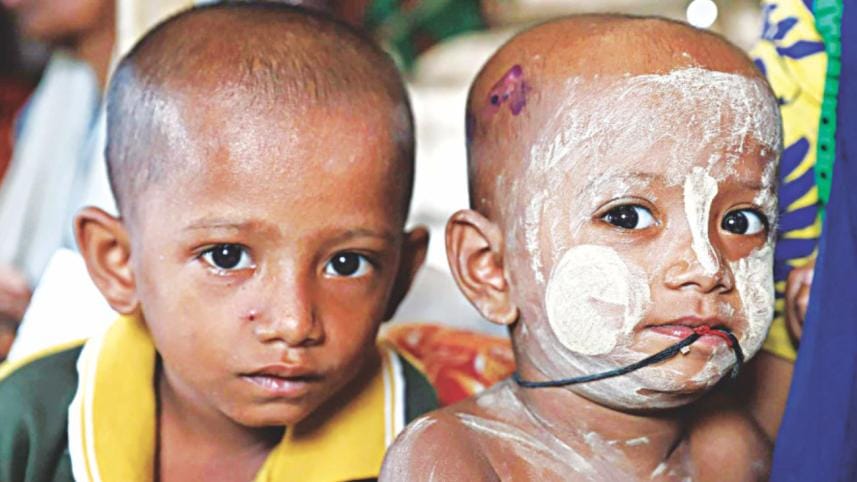Rohingya Orphans: Still recoiling in horror, pain

Four-year-old Nur Khan cringes in fear whenever he sees someone unknown near his shack in Ukhia of Cox's Bazar. When he comes across anyone holding any object, he shudders. There's a reason for that: five weeks ago, the child witnessed both his parents being brutally murdered.
His younger brother, one-and-half-year old Nur Hasan, was lucky as he did not see the barbarity, but his elder brother is scarred for life.
Their father, Shahidul Amin, was a grocer in Bolly Bazar in Mangduaw, Myanmar. The day when he was killed along with his wife, their paternal grandfather asked their maternal grandmother to take the children and flee immediately.
"Leave the country as soon as possible, he said. I left taking them with me," Rafia Begum, their grandmother who brought them to Bangladesh, told this correspondent yesterday.
"We crossed the border on September 1 but have not been able to contact Hasan's grandfather ever since," said Rafia, a widow in her 50s. Weighed down with pain and suffering, she seemed to have aged a decade in the past month.
While their grandmother spoke of the strenuous journey to escape the conflict-ridden Rakhine state, Nur Khan stared vacantly, into seemingly nothingness. He kept mum when asked what his name was. He did not wish to speak, especially to a stranger.
Nur Khan seemed like he did not know who to trust outside of his immediate family.
Famished and riddled with lesions all over their bodies, the siblings are among the 7,000 Rohingya orphans, a number authorities presume will double by the time they have finished surveying the recent influx of refugees from Myanmar.
To deal with the growing number of orphan children, the Department of Social Welfare under the Social Welfare Ministry has already taken up a project to register those in the Rohingya camps from September 20.
Since then, a total of 6,797 Rohingya orphan children, who the social welfare officials term "Myanmar National Orphan Child" were registered.
Pritom Kumar Chowdhury, Deputy Director of Department of Social Welfare, said, "We hope that we can complete the registration process within the next week. We are apprehending that the number could double."
He also said that after completing the registration process, they will be given smart cards.
"We have already applied to the Deputy Commissioner Cox's Bazar to allocate 200 acres of land in Balukhali dedicated to these children to build shelter for them."
Contacted, Md. Ali Hossain, DC of Cox's Bazar, said, "We have received an application from the department of social welfare. After completing their registration process, we will certainly allocate land for them if they want to set up shelter centre for the orphan children in Balukhali area."
Sobbir Ahmed, a block leader in Tyingkhali temporary shelter centre in Ukhia upazila, said there are hundreds of children who have lost both their parents; the lucky ones, if the word even applies, have lost either a father or mother.
Sabika (8), Sehena (6), Jennat Ara (4) and Rohina (2.5) are three sisters who can at least count on the warmth of a mother, a comfort no longer afforded to thousands of Rohingya children.
Sabika now looks after her siblings when her mother Saila Khatun goes to collect relief for them. When asked where their father was, neither Sabika nor Sehena gave any reply. They did not know what to say, perhaps hope preventing them from saying they no longer had one.
Seeing this correspondent, their aunt, Layla Khatun, came forward saying their father Salimullah was a wood trader. They all left the house when chaos broke in Myanmar but returned home after a while. However, one day all of a sudden, the Myanmar army raided their house and killed their father. On September 5, their mother Saila Khatun crossed the border and took shelter in Tyingkhali.
Now, the girls have to rely solely on their mother.
According to UNB, around 18,523 pregnant Rohingya women have entered Bangladesh during the massive exodus in Rakhine state in Myanmar.
So far, some 150 women have given birth to their babies in Bangladesh, sources at the Health Department said.




 For all latest news, follow The Daily Star's Google News channel.
For all latest news, follow The Daily Star's Google News channel.
Comments